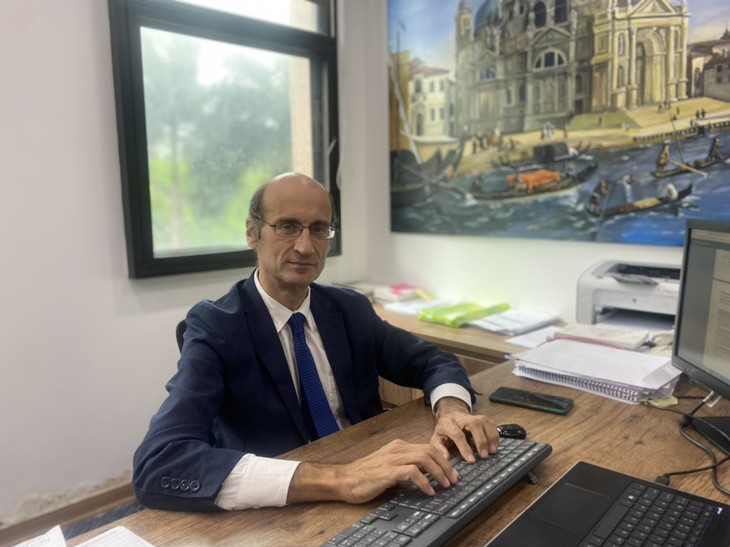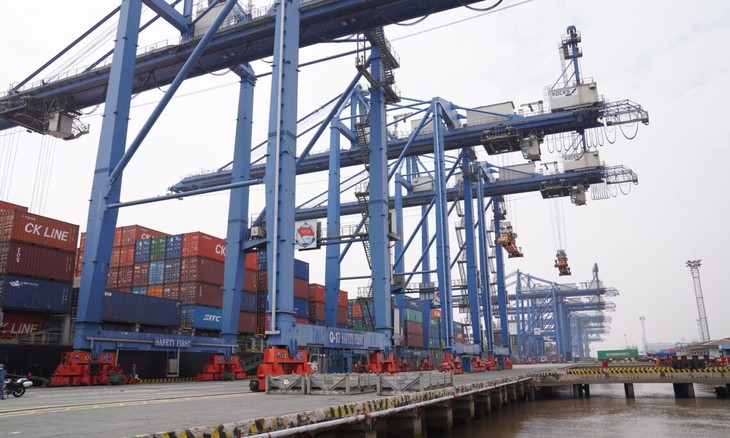(VOVWORLD) - The United States Agency for International Development (USAID), an independent agency of the US government, is conducting the Trade Facilitation Program in Vietnam. It aims to support the Government of Vietnam to adopt and implement a risk management approach to customs and specialized inspection agencies. USAID said this will assist Vietnam in achieving its development objectives while reducing the time and cost to trade. In this week’s Q&A, Dr. Claudio Dordi, Director of the Trade Facilitation Program, will talk about US support for reforming Vietnam’s import and export procedures.
 Dr. Claudio Dordi, Director of USAID Trade Facilitation Program Dr. Claudio Dordi, Director of USAID Trade Facilitation Program
|
Bao Tram: I know that the 5-year USAID Trade Facilitation Program began in 2018. That means it only has one more year to go. What results have there been so far?
Claudio Dordi: Provided that the program works directly as a counterpart with the Ministry of Finance and especially the General Department of Vietnam Customs. With them we’ve implemented several activities in the last 4 years and achieved some important results. For example, the customs clearance time has been reduced substantially in the last year from 2020; the time to import goods was reduced by 12% and the time to export goods for companies was reduced by 30%. Moreover, we’ve worked a lot with the government, with the customs, with Ministry of Finance, and with other ministries to promote policy reforms and modify the domestic legislation in order to make much easier and a better legal business environment for companies. We conducted an assessment of the 5-year reform between 2015 and 2020 of the government to improve the import and export procedures and our final report including recommendations and those recommendations has been included in a new resolution of the government for promoting further reform in the next few years. So we don't work only as fixing the present problems, but we try to improve the situation in the future, making the business environment more predictable for companies.
Bao Tram: What are Vietnam’s biggest customs bottlenecks?
Claudio Dordi: We realized that the quality of officials of the Vietnamese customs is very high - their capacity, the knowledge of their problems, and their ability to manage the problems. But sometimes there are problems in terms of the number of government agencies that businesses have to deal with. There are many agencies that are irrelevant for import and export procedures. For example, if you need to demonstrate that your exported food products are in line with safety provision in Vietnam. Safety provision are necessary not to harm domestic Vietnamese consumers. You need to present the certificate to the ministry of agriculture and rural development and some other ministries. This example means that most of the problems related to import and export procedures are due to the difficult coordination between the different agencies in charge of these procedures at the border.
Bao Tram: What is your recommendation for fixing the problem?
Claudio Dordi: In order to solve this problem, in an agreement with the custom sector, we started working with customs, with line ministries, with specific agencies in order to address their concerns, their challenges they are facing in import and export procedures. Of course, this will take a lot of time because the procedures are complicated. When you think about import and export procedures to clear goods, authorities have a dilemma. The dilemma is, first our objective, to reduce the costs and time of inspection in order to promote trade. But on the other side of the balance is that we need, in any case, to control the quality of imported goods to prevent those domestic consumers aren’t harmed by the imported goods. So, this is a balance between the opposing needs. In general, what we have done we convinced about the importance of facilitating trade, but not giving up the control.
Bao Tram: Which provinces have seen the clearest benefit from the program?
Claudio Dordi: We have several success stories in the selected provinces but HCMC could be the best example, provided all the provinces perform quite well. I want to introduce you the results of an activity in HCMC which is even a bit wider than an activity only focused on import and export procedures. We have been requested by the government to conduct an assessment of the main reasons causing congestion in the cut line port in HCMC in order to identify mitigating measures. …. and we identified the main reasons for that. Then we issued some recommendations. Two out of a number of infrastructural recommendations had been taking on board now by another USAID’s invested project. This project is carrying out a complete economic, social and financial feasibility study to verify whether these recommendations to improve the situation will work. Once conducted these, what will happen? The government will open to investors through, for example, the private public partnership, methodology, to collect financial resources and commitments from investors in order to carry out these kinds of recommendations.
 Cat Lai Terminal, Vietnam’s busiest container operation, located at the Port of Ho Chi Minh City (Photo: vn.usembassy.gov) Cat Lai Terminal, Vietnam’s busiest container operation, located at the Port of Ho Chi Minh City (Photo: vn.usembassy.gov)
|
Bao Tram: What is the plan for the remainder of the program?
Claudio Dordi: Now that we can meet in person, that we can develop our activities. We are in practice of 3 important objectives. First of all is to further support the role of the private sector in advocating for trade reforms and in monitoring the implementation of the reforms. Secondly is to further and accelerate the digitalization of customs procedures which is, from our point of view, one of the key points. Third, we keep on working with policy reforms, so reforming the policy at central level in order to make it more clear, more transparent, and more focus and targeting the right problems.
Bao Tram: That was Mr. Claudio Dordi, Director of the USAID Trade Facilitation Program. Thank you, Mr. Dordi, for granting VOV this interview.
Claudio Dordi: You are welcome. It’s my pleasure.